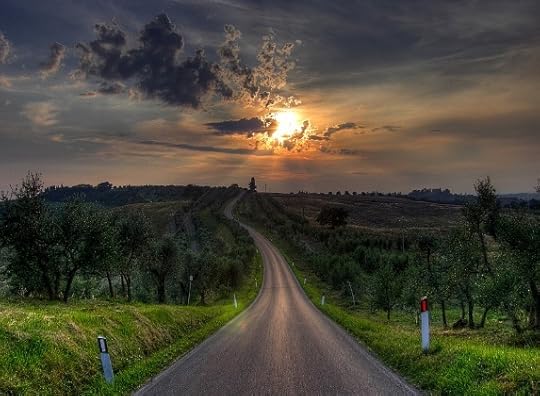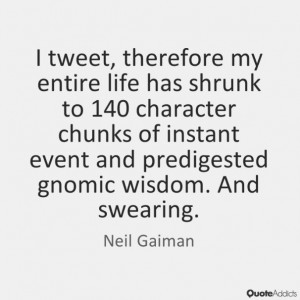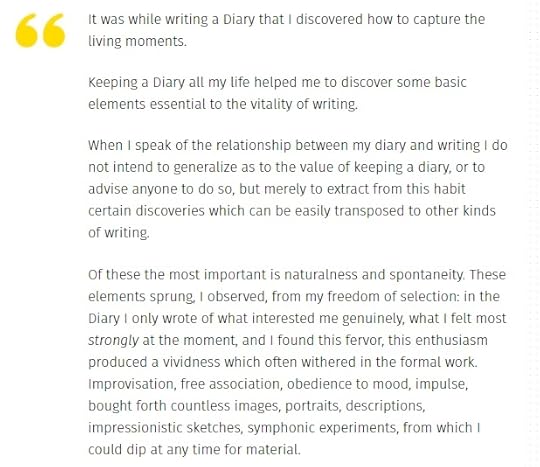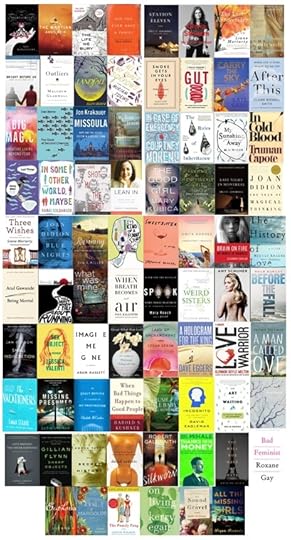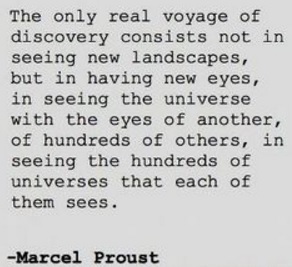Kim Hooper's Blog, page 33
June 20, 2017
Where do ideas come from?
Where did you get the idea for your book? This is one of the most common questions I am asked. I’ve learned to answer it succinctly by mentioning how I’d heard about people faking their deaths on 9/11 to get insurance payouts and that triggered a thought of, “Well, what if someone just didn’t show up to work that day and decided to disappear?” But, the truth is, it wasn’t that linear or magical. I don’t really know how I got the idea. I mean, yes, I heard about people faking their deaths for insurance money, but I hear intriguing things on the news all the time. I don’t know why that stuck with me and why it spawned a whole novel. There are probably personal issues that contributed. I was at a point in my life when I was daydreaming of escape, etc, etc. But those are also complex and don’t provide a straightforward answer to where the idea for the book originated.
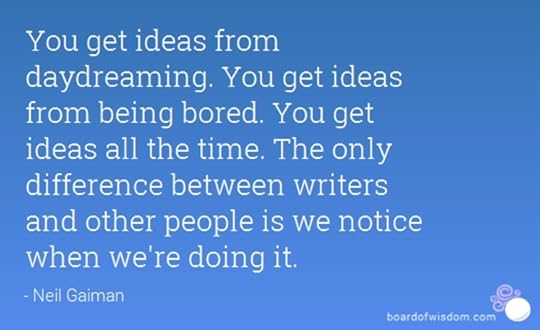
I’ve heard a writer say an idea came to her in a dream. I’ve heard many writers say characters were inspired by family members or other loved ones. I’ve heard writers say that the “emotional thread” of the story is very “real,” though the plot is not. If I were to guess, most ideas come when something a writer sees/hears/touches/feels triggers a reaction that elicits a response of “I need to write about this.” That writing may be a journal entry or a letter. It may come out as a personal essay or a memoir. It may be a short story that evolves into a novel. I don’t know why certain forms call to us at certain times. And I don’t know why certain experiences trigger while others don’t.
In her Writer Unboxed post, “Who Knows Where Thoughts come From?”, Allie Larkin gathers insight from a number of writers about where they get their ideas:
“I’m a journalist in my other life, so I’m constantly uncovering fascinating bits of research or interviewing people who are going through extraordinary things. The little nuggets or tidbits that I can’t stop turning over in my mind— they grow into my novel ideas.” ~Colleen Oakley
“While researching one book, I am always finding ideas for the next hundred. Fascinating facts I wish I had space to include, forgotten corners of history I wish I had more time to explore, amazing stories I wish I was writing. I jot each of these on a blank index card so that I won’t forget and add to a box where I have hundreds of these cards. Usually one persists in my imagination and I know just which card to draw when it comes time to start a new project, but I always pull out the others. I spread them all over the floors and tiptoe around each, seeing what else catches my eye. Then I see which of the cards I’ve set aside can be tied together to make an entire book. For me, plots are little pieces stitched together to make one character’s story.” ~Jessica Brockmole
“I get a lot of ideas from writing travel articles. My newest novel was inspired by a story I wrote about volunteering for the Champagne harvest.” ~Ann Mah
“My last several books have been a fusion of several stories that I’ve read about in newspapers or online. For instance, for Fractured, I read a judgment about neighbors fighting over ridiculous things. And then a few weeks later I read an article about a man who had been charged with manslaughter for running over his neighbor with his car. They had been fighting over recycling! These two things were the genesis.” ~Catherine McKenzie
“I appear to be one of the rare authors (the only one on earth?) who does *not* have 100 book ideas swirling in my head at all times. Rather, at any given time, I have a *single* idea — for the book I’m working on in that moment. Every time I draft a novel, I tell my family, “This may be my last one, because this is the only idea I have.” But once I’ve turned in the book, and have taken a bit of time to regroup, I find that the next idea always comes to me soon enough. It’s usually from a combination of (a) a sliver of an idea inspired by a public radio story or some non-fiction thing I’ve read + (b) a feeling/issue/life struggle I’ve thought a lot about and want to explore through writing + (c) an idea for a main character that comes from a composite of many people or is loosely suggested by one particular person. I have learned that if I am patient and open, a + b + c will happen, and usually quite quickly. And then I start drafting, and I tell my family, “This may be my last one, because this is the only idea I have.” (I’m reading Jane Smiley’s Thirteen Ways of Looking at the Novel. In it, she says she has had 16 ideas for books in her entire life, and she has published 14 books. That makes me feel better!)” ~Julie Lawson Timmer
“So far all of my books have been inspired by an article or true story. When I come across something that grabs me, I save it on a private Pinterest board of ideas. My latest was inspired by an article I read in Vanity Fair. Sometimes I’ll stumble across a person who seems interesting and I’ll pin their Wikipedia page, or something along those lines. Sometimes I’ll just take a picture of something myself and pin that.” ~Michelle Gable
“I usually end up doing a lot of brainstorming with my agent and editor and once we think we’ve hit on something, I’ll go off and do some preliminary research to make sure the subject has legs.” ~Renee Rosen
I keep a book of ideas. There are probably a hundred potential stories in there. Some of the ideas come from the news, or from an article in a magazine, or from a conversation with someone, or from a book I’m reading. Very rarely does an idea come from a personal, real-life experience. My life just isn’t that interesting. There are certain ideas in my little book that are “juicy,” but I can’t work up the interest to write in-depth about them. I don’t know why. What a writer gravitates to is very personal and unique. It’s all so mysterious. That, to me, is what makes writing (and reading) exciting. Even if two writers have the same exact idea, the resulting stories will be so different because they are rooted in individual perspectives.
I love when I read a book and I think, “Wow, how did they come up with this?” Even though I know the origination of ideas is an enigmatic thing, I still ask other writers where they get their ideas. And the answers are always fuzzy. As they should be. If there wasn’t some mystery behind storytelling, it would be way less fun.
The post Where do ideas come from? appeared first on Fiction Writing Blog.
June 13, 2017
A chat with Kemper Donovan
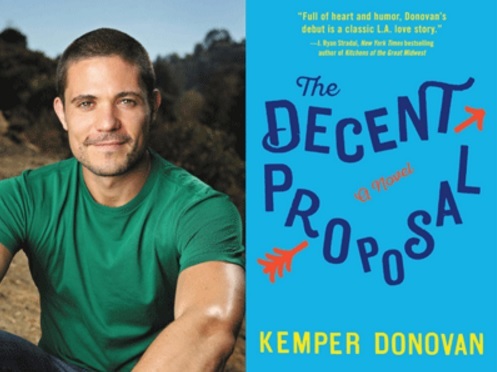
At Literary Orange in April, I was seated next to Kemper Donovan for lunch. He’s a fellow debut novelist. We got to talking about the craziness of publishing your first book and our angst about social media. I messaged him on Twitter that night because, well, social media happens to be the best way to connect with people, like it or not. He sent me a message back saying he was just telling his husband about meeting me and I said, “I was just telling my husband about meeting you, too!”
Of course, I bought his book, The Decent Proposal, right away. It’s always nerve-wracking to read a book by someone you want to like. What if you don’t like it? Thankfully, I really loved his book. The premise is awesome: a struggling Hollywood producer and an up-and-coming lawyer meet when they get a proposal from an anonymous benefactor–they’ll split a million dollars if they agree to spend at least 2 hours together every week for a year. It’s witty and sweet and easy to read in a couple days.
We have since progressed to abandoning Twitter and communicating via email. I bombarded him with some questions for this post and here is what he had to say.
When did you start writing? Has it always been in your blood?
I actually didn’t start writing until I was almost thirty, and I have to say it really wasn’t “in my blood” till that point. This touches on an issue I ran across quite frequently before publishing my novel, which is that 99 out of 100 writers will say they’ve been writing since childhood, and while I have no doubt that’s true, reading about those writers would give me this sinking feeling that I was fooling myself trying to be a writer, not having been obsessed with the craft since before I could remember…. (The only author I came across who said she hadn’t started writing till adulthood was Ann Brashares, the author of the Sisterhood of the Traveling Pants series. I remember this because she really was the only one! I took great comfort in Ann Brashares on many an otherwise hopeless day of writing….) As I said, I don’t doubt those writers; I’m sure they *were* obsessed with writing early on. And I have a whole theory as to why there are so many of them and so few Ann Brashareses (?!) of the world. Basically, all writers except for those rare geniuses among us (of which I certainly am not one) are terrible at the start. Just terrible. But it’s much easier being terrible as a child, when your whole life is ahead of you and no one is expecting you to be not terrible, and when you probably don’t even realize how terrible you truly are. And then you get into a routine of writing, and revising, etc., so that by the time you’re an adult, writing is a more organic process and you’re perhaps a tiny bit better than terrible. But if you don’t start writing till you’re an adult—fully cognizant of how quickly time slips by, unrelentingly hard on yourself from the get-go—it’s easy to get discouraged. You start writing and you tell yourself, “this is crap!” (because it *is* crap), and then you stop. There’s no established routine, no sense that things will get better eventually…. So I think that’s why most people who make it are the ones who’ve been writing since childhood—not because you have to have “wanted it” since childhood to be a real writer, but because the childhood writers have the tools/mindset at hand…. My conclusion to all this is to say: don’t give up, adult-beginner writers! Because it’s possible. Harder. But possible.
Addendum to the above (don’t worry, I’ll be more concise in my other answers!): if I was going to identify any sort of “litmus test” for what it takes to be a writer, I would say it’s a love of reading. Writing is all about words, after all, so if you aren’t much of a reader, I’m not sure how you spontaneously start creating meaningful words of your own…. And on that score, I can definitely say that reading has always been “in my blood.”
Do you have a writing routine or writing rules that help with productivity?
I try to wake up as early as I can (without that being counterproductive—I’ve definitely had those days where I’m so exhausted by 8am that I should’ve just slept an hour or two more, and would’ve been better off for it!). I find that my mind is much clearer in the morning; by nighttime I’ve got the news, the internet, everything that happened to me that day, cluttering my brain…. That said, I have a baby now, so I’ve had to take the time where I can get it—mainly in the afternoon, which isn’t my preferred time. But, you know, necessity is the mother of all invention, etc., etc. I probably get more done in less time, now that my day is more constrained. Irony!
What’s your least favorite interview question? I will not take offense if it’s one of mine.
Ha; it’s not! I think it might be some form of “is your book real?” It’s crazy to me how so many people seem hell-bent on proving that a fictional story is not in fact fiction. I think I’ve dealt with this a lot less than others, since my book features a fairly outlandish establishing concept (look at this seamless segue to your next question!), but it still comes up occasionally.
In your book, a struggling Hollywood producer and an up-and-coming lawyer meet when they get a proposal from an anonymous benefactor: They’ll split a million dollars if they agree to spend at least 2 hours together every week for a year. How did you get this fantastic idea?
I wish I had a great story about my “eureka!” moment when I came up with this concept, but in reality the idea emerged from the primordial ooze that was this book for so many years…. This novel was actually the first thing I (seriously) wrote, so it came about extremely slooooooowly. The character I started with was in fact the anonymous benefactor, who was not so anonymous in my earlier drafts! For years the novel started off with this person…. So it really was an organic process, which is strange for a “high-concept” idea like this one, but there you go.
Your book is like a love letter to Los Angeles in many ways. Did you grow up in L.A.? What are your favorite neighborhoods?
I did not! At some point in the book I mention how my male lead has the enthusiasm of a convert, and that is exactly how I would characterize my enthusiasm for L.A. I grew up on the East Coast and moved out to L.A. when I was 25. This was back in 2004 when people were still talking about what a “wasteland” L.A. was, how it had no “culture,” etc. A lot of that nonsense has died down now, but I was honestly shocked by how much I loved the city when I moved here. I kept waiting for the other shoe to drop, but it never did.
I’m so glad that people have picked up on my affection for Los Angeles in the book, because I went to great pains to portray it…. It was important to me to showcase that affection, not only because it’s how I feel but because L.A. is so rarely depicted this way. It’s either a superficial entertainment bubble, or a crime-ridden world of shadow…. But really, it’s a city where millions of people live their varied lives.
As a debut novelist, I know the journey has some ups and downs. What advice would you give to new writers?
I would tell new writers to embrace the process of writing itself, because that’s all you can control. I think a lot of writers dream about getting published, and of course it is wonderful to be published, a true milestone, but getting published (and promoting your book) is another beast entirely, requiring you to both give up control and do all sorts of things you may not be comfortable doing (getting on social media was a big one for me, for instance). But the one thing that will always be yours is the writing process itself. This process has to be why you do it.
I know you’re a runner and you think that has helped you as a writer. I couldn’t agree more. How do you think running and writing relate to each other?
Well, they are both solitary activities…. At least, the way I write and run, I do them completely alone, and I think it’s that way for most people. You can have a writers’ group, or run on weekends with friends, but for the most part they are activities you have to do alone. And I find a lot of solace in that. In a way I think of writing and running as two extremes along a spectrum of solitary activity, where on the one end, you’re sitting and staring in front of a laptop focusing your mind on a specific task—all mental activity, no physical—and on the other you’re upright, in motion, pushing your body as hard as it will go while letting your mind wander—all physical activity, no mental. But the two extremes complement each other, and I don’t think it’s a coincidence that I’ll spend hours banging my head against a passage of writing, then go out for a run and “spontaneously” come up with a solution. This happens a lot—as if the running is an extension of the writing….
Sometimes I read a book and I think, “Hot damn, I’m never going to write like THAT.” What books have knocked your socks off?
Oh, there are too many to count…. (And that feeling is one of my favorite feelings to encounter as a reader.) I do remember reading a Maggie Shipstead novel—her second one, Astonish Me—when my agent was on submission with my novel and thinking, “Well this is hopeless. Why would anyone read my trash when they could read this?” And then the next day my agent called me to say she had interest! Clearly all Maggie Shipstead novels are good-luck charms.
Are you working on anything right now? (Note: This is my least favorite interview question)
Haha, I once made the analogy that asking an author—especially a debut author—if they’re working on another book is exactly as obnoxious as asking the new parent of an only child if/when they’re going to have another…. Can’t I just enjoy the one?! But I am working on a second novel now. Stand-alone, nothing to do with the first….
How has having a baby affected your writing life?
I already mentioned the biggest impact, which is forcing me to practice better time-management. Beyond that, it’s strange, but—and forgive me for getting philosophical in my answer to a fairly pragmatic question—having a baby is by no means as dramatic as I expected it to be. And I mean that in the best of ways. The baby arrives, your life shifts, and it could never be different from what it has become. I think the same phenomenon happens to many people when they fall in love. We’re conditioned to expect fireworks, drama, but sometimes the most important changes don’t have that because they’re important. Does that sound insane?
What are 3 random things people would be surprised to know about you?
1) I co-host a podcast called All About Agatha in which my co-host and I are rereading all of Agatha Christie’s 66 mystery novels, in (UK) publication order…. You can download it on iTunes or wherever you listen to podcasts!
2) I play piano, violin, and trombone. Though I haven’t played trombone in so long, I doubt I could make much of a recognizable sound from one now. The violin, on the other hand, I picked up just 2-3 years ago, so I’m still very much a beginner. The piano has been a lifelong love. Since becoming a writer I enjoy building skills on musical instruments even more than I did before because the time I spend on an instrument has a guaranteed payoff, whereas the time I spend writing each day definitely does not!
3) I am a retired lawyer, and have been since the ripe age of 25 when I graduated law school, took the (NY) bar, passed the bar, and then assumed “retired” status to avoid paying dues and whatnot, as I never practiced.
The post A chat with Kemper Donovan appeared first on Fiction Writing Blog.
May 30, 2017
A chat with Steven Rowley
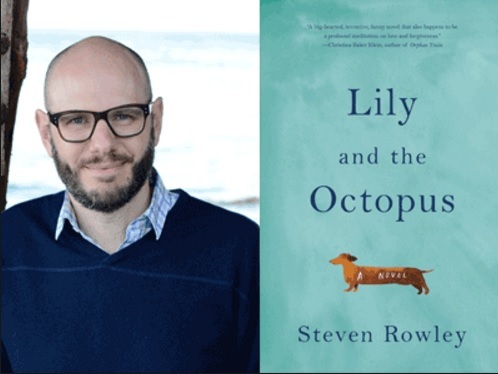
I was lucky enough to have Steven Rowley at my lunch table at Literary Orange in April. I asked him the title of his book and he said, “Lily and the Octopus” and I said, “That’s in my Amazon cart!” And he said, “Well, buy it already!” I do well with direct orders. I bought it and read it in 2 days. It was, in a word, amazing. Maybe it’s because I have such a strong attachment to my pets, but this book hit me…hard. I laughed, I cried, I wanted more. It’s been a while since a book stirred up this much emotion in me.
***The paperback comes out TODAY, so get on it***
I bombarded Steven with a bunch of questions. Here are his answers.
First of all, I have to ask, did you cry when you were writing this book? Because I cried like a baby reading it. I laughed too, but there were definitely tears and I’m not usually a crier.
I did. And then again when writing the second draft. And then again on the third and in copyediting and on first pass pages… But not always at the parts you’d expect. And sometimes I cried tears of real joy. As much as this is the story of a man and his dog, I see it as a story about a man who is stuck in his life, and the things he has to accept to break free. I suppose I felt that way myself for a stretch of time and the obstacles in my own path were, while not outright imagined, greatly exaggerated. So when I see Ted gain full acceptance of his circumstances and take the first steps to move forward to a better life, I can’t help but feel overcome.
I know you had a dog named Lily in real life. This book is such a tribute to her. Do you pull from your life a lot when you write? If so, how do your friends and family feel about that?
I did have a dog named Lily and the dog that I had is very much the dog that’s in the book. That said, I built a novel around real memories I had of our time together. It was important to me only that I stick to the emotional truth of the story, no matter how strange (or tentacular!) that story became. Because Lily was my dog and the book is written in the first person, a lot of readers assume Ted is me. And that’s okay. Even when I hear readers say they don’t like him. I did this to myself, I chose to write blend fact and fiction. I think it was probably harder for the people around me who did not choose this. And more so the ones who aren’t in the book. To elevate the central relationship, I stripped the book of as many other characters as I could. Ted has one parent, and one sister, one friend and one therapist, where in real life I have two parents and three siblings, many friends, and a team of mental health professionals. (That last part was a joke.) I’ve had friends approach me a bit miffed, saying “Hey, I was there for you during that time.” And I have to reassure them that I haven’t forgotten, that their support meant the world to me, that this is a novel and to look for their names in the acknowledgments.
As I told you, I was a little wary about the “octopus on the dog’s head” element of your book. But I quickly understood it and loved it. Were you worried about how readers would react to the octopus?
I wasn’t, because initially I wrote this just for me. I never imagined it would be published, let alone be a bestseller or translated into twenty languages. It was just me at my kitchen table, grieving the loss of a very special companion and writing so that I could heal. And it made such perfect sense to me. I was writing about attachment and how difficult it can be to let go. In that respect, having a metaphor with tentacles — something that could have a literal stranglehold on you — seemed apt. But I did make the conscious decision to introduce the octopus right on page 2, to steamroll right over readers before you could object or pause to say “Wait, what?” So there may have been part of me that knew on some level it was a stretch. But once I had the octopus, it gave the book a skeleton. (I always laugh saying that as octopuses are invertebrates.) I knew it would have to be written in eight parts and each part should have an octopus theme. Once I had the octopus, the whole book set sail.
Readers really love this book. How has the debut-book experience been for you?
The reaction to this book has been incredibly humbling. I wrote my truth, but I acknowledge it’s a weird little book. I think what I’ve learned is that everyone is weird in their own way — and I mean that as a compliment. We’re all weird and it’s a delight! So maybe you would not have seen an octopus in a similar situation, you might have had your own cipher — a hippopotamus or a giraffe. Ha. That’s human. Many readers have shared with me their experiences with illness, or cancer, or loss and what they saw their own struggle as and it’s made me feel really close to them. Zadie Smith had a wonderful line in an interview recently where she said (and I’m paraphrasing) that as writers we can say this is how we feel, maybe you feel this way too, and for a short time — over the course of the book — maybe we can feel this way together. I just love that. The idea of reading as fellowship.
How long did it take you to write this book? It’s your publishing debut, but did you have other books stuck in desk drawers before this one? What was the journey to publication like for you?
I wrote the first draft of this book in one hundred days. Insane. But I wrote every single day, terrified that if I stopped writing even once, that the story would dry up, that the octopus would take back his ink. I went through several more revisions and tinkered for the better part of a year. I do have two other manuscripts on a shelf that will never see the light of day, so I’m not sure that even when I decided to pursue publication, anything would come of it. In fact, when I contacted agents to say “Would you like to read my book about a dog with an octopus attached to its head?,” I heard absolutely nothing in return. It made me realize I had to get much smarter in how I talked about the book, as in fact, the dog and the octopus are almost secondary to the story of man’s emotional journey. Even then, I grew so frustrated in trying for a year to land an agent that I decided to self-publish. I hired a freelance editor in New York named Molly Lindley-Pisani (aspiring writers, I highly recommend working with a freelance editor before approaching agents and publishers) who helped me through one final draft and she was the one who really told me that I shouldn’t self publish. In fact, she was the one who recommended the book to an editor at Simon & Schuster and the rest is history.
The story really speaks to human loneliness and the attachment between pets and their people (aka their everything). What do you think it is about pet stories that strikes such a chord with readers?
Pet stories make great books because they are such deep love stories, and are usually explorations of loss. It’s just the sad truth, most animals don’t live as long as humans. Love and loss, so universal. But knowing this, knowing this is part of the deal, we don’t love our pets any less or keep them at an arm’s distance. There is so much unprocessed grief in the world, and some of that can be processed by reading books. And I really wanted to take pet grief seriously because the pain is very real and people often don’t treat it as seriously as it is. A glib poem is not going to comfort. Asking a grieving pet owner when they are getting another comes off as dismissive. People don’t have bad intentions, but as our relationships with our animals have changed, so must processing their loss. I had dogs as a kid and they were outdoor dogs that lived in our barn. Now dogs and pets have full-fledged family member status and we need to grieve them as such.
Can you say anything about your next book? Inquiring minds want to know…
I’m writing a story about mothers and sons and while there’s no octopus, there’s one slightly larger than life character that intersects with the story. More realism than magical realism, but still hopefully a sprinkle of magic.
Do you have any writing routines or rules that you swear by?
Write early — the day will throw every reason at you not to work at your craft, so get it done before the day can derail you. Also, if you have a hard time sitting down and getting straight to work — if you lose an hour checking the news and Facebook and Twitter — understand that that’s part of your process and build that hour into your writing time. Otherwise you’ll get discouraged and beat yourself up for it, losing even more valuable creative time. Also, we’re at an interesting moment in our history and there is a lot stress in our national psyche. Try to limit what breaks through, especially in these tough times. Don’t disconnect. Don’t care less. But it’s almost impossible to be in a creative headspace and be at RAGE 11 ALL THE TIME over current events. Protect that headspace. Make art. Carve out another time during your week to fight the good fight.
I ask this of everyone: What are 3 random things people would be surprised to know about you?
1.) I don’t have any tattoos. Ted gets a tattoo in the book which I decidedly do not have.
2.) I do have another dog, a rescue terrier named Tilda Swinton.
3.) Despite being known for writing a tearjerker — I’m surprisingly funny! Promise!
The post A chat with Steven Rowley appeared first on Fiction Writing Blog.
May 23, 2017
Writing every day for 100 days
This past weekend (Sunday, to be exact), I decided to start writing again. I say “again” because I’d stopped for a while (which is why you haven’t heard from me very often on this blog. What do you say on a blog about writing when you’re not writing?). The reasons for stopping are all-too-typical and boring. I was getting very up in my head about my “writing career.” Then I had a good email chat with Tracy Barone, and I started to feel that itch to just write. I remembered back to the days, before my book was published, when I was blissfully ignorant of the industry and just wrote what I wanted to write. It’s time to return to that and enjoy the journey without getting attached to a destination. Like a Buddhist.
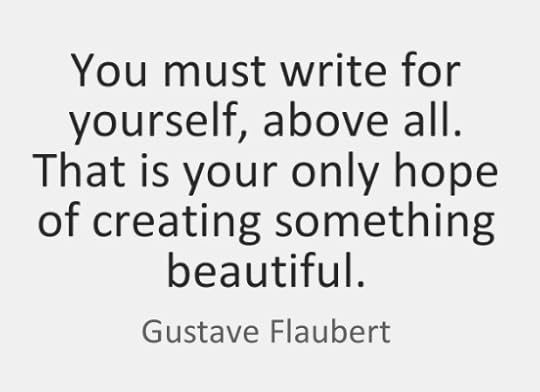
I’m working on a novel that I started back in 2009 and then set aside. It’s exciting to write again. I had a hard time sleeping on Sunday night because I kept thinking about it. That’s the good kind of insomnia (if there is such a thing). My goal is to write every day for the next 100 days. I did it before and it was really successful. I should be able to have a complete draft of this novel by the end of the 100 days.
I’ll let you know how it goes on Day 101 (August 29). Wish me luck!
The post Writing every day for 100 days appeared first on Fiction Writing Blog.
May 14, 2017
A chat with Tracy Barone
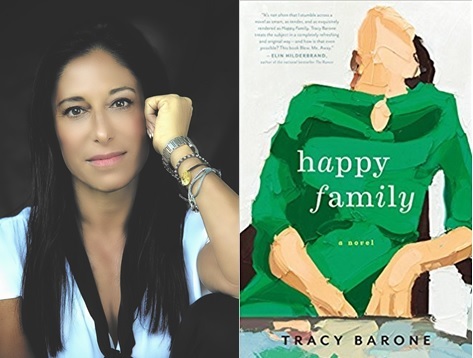
In April, I was lucky enough to be on a panel at Literary Orange, one of the biggest book events in Southern California. I was also lucky enough to meet Tracy Barone. We were both attempting to find the green room. Nothing bonds people better than being lost together. Her panel was right before mine, so I sat in. I’d had her book, Happy Family, in my Amazon cart since it came out last year (I “save” hundreds of books in there and go on semi-annual book binges. I’m weird). After meeting her and hearing her talk about the book, I finally bought it. Within fifty pages, my jaw was on the floor. This is one of those books that makes you doubt your own ability as a writer. The story is an epic family drama with heart. The characters are so well-drawn that you assume the author has been each of them in numerous past lives. I just had to reconnect with Tracy after I read her book. She was nice enough to answer some questions for me.
You started out working on movies in Hollywood, right? Were you always “a writer” at heart? What motivated you to dedicate yourself to this novel?
I’ve always been a writer at heart. I wrote my first short story and several bad ballads inspired by the Rhyme of the Ancient Mariner (ah youth!) when I was ten years old and have been a storyteller in one form or another ever since. I fell in love with dramatic writing and was a playwright in NYC during the 80’s, a very exciting time for theatre. I was doing a lot of experimental work with a very talented group of actors and directors. During that time I was selected for the 92nd Street Y program of young, upcoming playwrights paired with masters for a series of readings. My “master” was Marsha Norman who had a big hit with “Night Mother” playing. During the critique, she told me that I was a colorist with a big palette and that I should write novels. I took that the wrong way at the time but she was right. A novel? The long form scared the hell of me. So it took me many years, and another career as a producer, to dedicate myself to writing a book. I could not have imagined “Happy Family” in any other form, it’s the way it came to me or through me.
“Happy Family” is such a beautifully-developed story. Did you have the full story in mind when you started, or did you develop it as you went?
Thank you for saying that. I had the full story in mind from the onset. Kind of like a musical composition, I kept the whole in mind while hearing the individual voices. But I developed as I went along because it’s a big story, it goes for many years, so what do I show? This took time and throwing a lot out.
What struck me about this book is how each of the characters seemed so real. When you introduced Cici, I thought, “She must be based on the author herself.” But then I thought the same of Cheri, Cici’s adopted daughter. Then I realized all the characters seemed “real.” What character do you connect with most? Do you still think about your characters?
That is I think what we all go for as writers, writing down to the truth, the essence, the “real” of our characters. Stripping away the layers, pushing them up against limits – often themselves – at least this is what interests me as a writer. On one level all of the characters are based on me or some part of me that I can imagine, but none of this is true in the book on a literal level. It’s hard to say which character I connect most with as I connect with parts of all of them; the good, the bad and the ugly. Cheri is the main character so I spent a lot of time in her head, her shoes, and the angry, frustrated, wanting connection but pushing it away parts of her tapped into my shadow side. Who wants to be that? But it’s a part of us, we have to make friends with it. I have an affinity for Billy Beal who is a minor character but I feel him deeply, his being misunderstood, his connection to the baby. I’m writing a TV pilot for “Happy Family” so I’m still thinking about these folks! Although the series jumps off from the novel and goes in many other directions so it’s a departure.
How much do you draw on personal experiences in your writing versus pure imagination and research?
It’s a combo platter. I am a research junkie so if I’m writing about a car from 1962 I know if it had seat belts, what the tires looked like, what colors it came in. Kind of obsessive on details. Usually though research is supplemental for me, not the source. Friends and family of writers should know that we draw from our experiences, that’s it’s all fair game. I tap into my experiences, some aspect of them may inspire a character or situation. I also write down snippets of dialogue I hear strangers say, great procrastination if I’m writing in a public space! I have a notebook filled with this and sometimes they filter into the story. But a lot of my writing is just off-roading into my imagination. That’s the most fun because who knows where that come from!
Speaking of research, you must have had to do quite a bit. You created a very realistic Italian mother in Cici, and your descriptions of the different medical situations in the book (I don’t want to give away too much of the story), were so authentic. Do you research before you write, or research as you go?
I research as I go along. In the case of Cici, I knew where I wanted her to be from in Italy and she was from my imagination as well as my experience with Italians and understanding that sensibility. For the bird hunting scene in Italy, for example, I knew what I wanted to accomplish, the character dynamics, the look and feel, what it smelled like, the sounds. I sketched it out and then researched what kind of guns would be used at the time, how the dogs would interact, the mechanics of shooting, what kind of birds would be hunted in that season. Then I went deeper, filling in the details. But it could just have easily worked the other way around. Getting the details first then writing the scene. I’ve done it that way as well.
This is your debut novel. What has the debut-book experience been like for you?
It’s a bit scary to put yourself out there for the first time. I was lucky to have a great editor in Lee Boudreaux and a wonderful team at Little Brown. And an amazing agent, Susan Golomb, who guided me through the process. As much as I knew the business of film, and that IS a business, I didn’t know much about publishing. The marketing mechanics and how so much is driven on early book sales, I wouldn’t have known that but it’s a lot like in film. There’s a lot of excitement and buzz around debuts which is fun but also a bit of pressure.
I always hate this question, but I have to ask it: Are you working on anything right now?
Right? It’s a tough question because I am working on a new book but it’s early days. I’ll just say it’s set in 2050 involving twins (male and female) who have the key to man’s past and future hidden where they’d least expect to find it: their DNA.
Do you have a tried-and-true writing routine? Any daily habits or rules?
Just show up. Every day. No set time, although I’m better in the morning and afternoons. By evening, I fade.
The post A chat with Tracy Barone appeared first on Fiction Writing Blog.
March 12, 2017
For the long haul
I’ve written a couple posts before about the similarities between writing and running (here and here). I’ve been thinking about it more lately. I haven’t been able to run for the past few months and, whereas this is something that used to torment me before, it doesn’t bother me now. I plan to be a lifelong runner, so I’m focused on the big picture. I accept there will be phases of not running due to illness, injury, lack of time, etc. If it takes me months to get back to running shape, so be it. I’m in no hurry.
In a way, writing is similar. When I was in my early twenties, I thought I had to be successful right away. I remember telling my first agent that I was going to quit my day job and focus on writing and she looked horrified. “Keep your day job,” she said. Young and naive, I was offended, thinking she didn’t have faith in me. But, really, she’d been around long enough to know that writing rarely leads to immediate success (and money). You have to be in it for the long haul (with a day job to fund the journey).
In the March/April issue of Poets & Writers, Kevin Wilson writes about this in “The necessity of failure”:
When I was twenty-three years old, I felt that if I didn’t have a book deal by the time I was twenty-five, I would be a failure. And if I couldn’t place a story in the New Yorker , what was the point? I wanted to find a wide readership immediately. I think this was partly my own intensity, my mania, but I also think culture suggests that this is the way things work. In the world of writing we’re constantly told that you need to find an agent, the implication being that nothing good will ever come of your writing if you don’t find an agent. We’re told that if your first book doesn’t sell well, you’ll probably never get another chance, because the book world is run by sales numbers and there’s less interest in growing a writer’s career. We’re told that you need publications to be taken seriously. And that’s fine; I think it’s good for writers to have some sense of the business behind writing. But the real focus should be on the writing itself.
This is so true. While I think it’s great to have goals in the business of writing, it’s more important to focus on the pure love of writing. It’s a lifelong craft. Just like I’ll always be a runner (well, body permitting), I will always be a writer. There is a peace that comes from trusting in that.
Wilson goes on:
Writing is not a finite thing that ends when you turn thirty or forty or fifty or sixty. With any luck, if you care about writing, it’s a lifetime pursuit. And, yes, it would be better to publish your first novel when you’re forty, as opposed to when you’re ninety, but the truth is, there is no single moment that defines us as writers. We write. Sometimes it’s good. Most times it’s not. As Samuel Beckett put it: ‘Ever tried. Ever failed. No matter. Try again. Fail again. Fail better.’ That’s all I want out of my artistic life. To fail better than the last time.
If I had any advice for a new writer, it would be: Focus on the journey, not the achievements. Granted, if someone said this to me when I was 20, I would have rolled my eyes. That’s the thing about perspective–it turns you into that person your younger self dismissed.
(By the way, if you haven’t read Kevin Wilson’s The Family Fang, I highly recommend it).
The post For the long haul appeared first on Fiction Writing Blog.
February 17, 2017
Writing in the age of distraction
I was hanging out with my nephews the other day (they are ages 4 and 6), and they navigated their way to Amazon.com on their iPad to show me which Legos they want. They were clicking around, zooming in and out, tapping the shopping cart. I feel like an old person saying this, but it’s crazy how times have changed.
It’s apparent to me now that I grew up in a technology revolution. I remember pay phones. I remember landlines. My sister had a pager. I remember dial-up AOL connections, the magic of those first chat rooms. I remember my first cell phone, good only for calls. I remember when texting went from “not a thing” to “a must.” I remember how I resisted, telling people, “Don’t text me. I don’t have a texting plan.” This is hilarious to me now.
Granted, I’m not that attached to my phone. I am a utilitarian texter. I don’t get into many text conversations. I use texting to send my husband grocery lists and tell people I’m “on my way.” I’m sporadic in my social media usage. I think I’ve posted a handful of selfies, and most of them were taken when I was slightly intoxicated. When I get home from work, I leave my phone in my purse so I can hang out with my husband. He is hardly ever on his phone, and he gets annoyed when I am (unless I’m playing Words with Friends, because he likes to play my turns).
It goes without saying that there are pros and cons to how involved we are with ourselves and each other and our larger world, thanks to Facebook and Instagram and all the other apps that make it possible to share anything and everything. It’s addicting–all this information, all this content. And it’s overwhelming. I worry that people will stop reading books (or, if they do read, the books will be short and airy because everyone has ADD now, developed in response to the sheer amount of sensory input we receive).
In this Writer Unboxed post, Allie Larkin writes about how her writing experience has changed as technology has evolved.
“[With my first book], I had lots of time to think things through. Social media wasn’t a big deal yet. Streaming video wasn’t a thing. My phone only made phone calls. There was much blank headspace to be had. Even when I had a full calendar, I still got stuck in line at the post office, and we did not yet have the technology to tweet about it…
But the internet took over. It got too easy to fill downtime. Not just in hedonistic ways. I do most of my research via audiobook when I’m walking or cleaning, and I’m grateful to be able to learn while I’m in motion. But my free thought time has become jam-packed with structured thought.”
My thoughts exactly.
My writing time is so different now. Before the Internet, I went to the library to do research. I had so few minute-by-minute distractions. I focused. My days were full of blank moments for reflection and contemplation. Now, I can’t even sit at a red light without the temptation to fill the time with something on my phone. What’s lost are those empty spaces, when ideas used to emerge and solutions to writer’s block made themselves apparent.
I have to try really hard now to create distraction-free down time. It’s especially difficult these days because I feel like if I go off the Internet for 24 hours, I’ll miss the real-time collapse of our government. Kidding, kind of. But, seriously, with all the political upheaval, I’m struggling to find the line between being informed and going insane. I can only absorb so much. And I’ve definitely been writing less because my mind is just…tired.
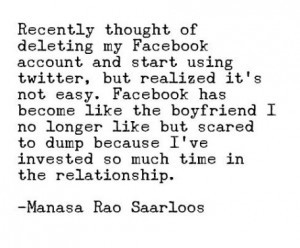
It does no good to fight reality, though. And I think writers will adjust to the world as it is. Stories will change, as they always change as society shifts. The way people read will change. Sometimes I worry I’ll end up like a 21st century blacksmith, trying to find a place for my weird, outdated passion. I will always write novels. I know that. That’s the one constant, even as my writing routine changes. I admit I’ve developed a bit of the ADD I mentioned above. And my writing reflects it. I don’t sit in a quiet room and write for several hours anymore. Well, rarely. Most of the time, I write in spurts–10 minutes here, 20 minutes there. The pace is more intense, because the pace of my surrounding world is more intense. In the end, I still write books. And I believe people will continue to read books, if only to escape that intense pace for a precious little while.
The post Writing in the age of distraction appeared first on Fiction Writing Blog.
January 13, 2017
My one New Year’s resolution
I’m not big on resolutions. I appreciate that the start of a new year offers an opportunity to take stock, but I usually shy away from all-out resolutions. Over the last few years, life has taught me that plans get interrupted, shit happens, and priorities change. And that’s okay. I guess that means I’m resolving to roll with the punches, go with the flow, take it as it comes, and a bunch of other similar clichés.
But, this year, I do have a small resolution: To start keeping a dream journal. I can feel your eyes rolling from here, but stay with me.
I kept a diary for about 20 years. I was obsessed with it. When I was a kid, I asked my parents for a fireproof safe to keep all my journals. They obliged on one of my birthdays. I still have those journals, in boxes in my garage (the fireproof safe is now used for important things, like birth certificates and passports). Like most diarists, I’ve never gone back and read through my entries. The simple act of writing them was the means and the end.
I stopped keeping a formal diary in my early thirties. I don’t know why, exactly. Life got busy. I got happy. I met my now-husband and found I enjoyed talking through things with him instead of writing about them (though, I’m sure he’d prefer I’d spare his listening ear at times). Still, when I can’t put my finger on how I feel about something, or when I’m really emotional about something, I send emails to myself. That’s my modern-day diary, I suppose.
Susan Sontag on keeping a diary: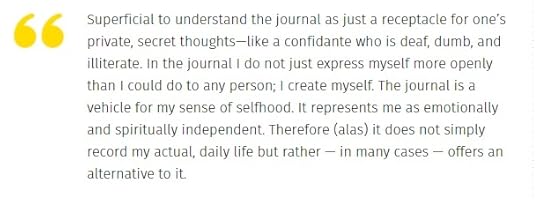
I’m somewhat famous in my inner circle for having bizarre dreams. The other night, in my dream world, my elementary school best friend (hi, Eurie!) slipped between two rock formations and Matthew McConaughey emerged with her in his arms saying, “Alright, alright, alright.” I won’t tell you more of my dreams because nobody really cares about other people’s dreams. The look on my husband’s face when I say, “I had the weirdest dream last night” pretty much confirms this. (Side note: My husband claims he hardly ever dreams, which is so strange to me. I dream every night, though sometimes I don’t remember the dreams clearly).
I’ve started to wonder if dreams are my creative mind getting its jollies when I’m too busy to indulge in writing a good piece of fiction (I seem to dream more when I’m not working on a novel). I’ve started to wonder if there’s something in my dreams that’s meant to guide the stories I tell (or, hell, my life decisions). I’ve been taking five minutes every morning to jot down what I remember from my dreams. So far, I haven’t had any epiphanies. But, it’s fun to commit to paper things I usually just forget about as the day goes on. As Virginia Woolf said about her diary-keeping, “The advantage of the method is that it sweeps up accidentally several stray matters which I should exclude if I hesitated, but which are the diamonds of the dustheap.”
Yes, diamonds of the dustheap. I mean, you never really know what’s in buried in your subconscious, right?
I’ll report back on any interesting findings (or additional appearances of Matthew McConaughey).
The post My one New Year’s resolution appeared first on Fiction Writing Blog.
December 26, 2016
Books I read in 2016
I can’t believe it’s that time of year again, time to look back on my year of reading. I read 78 books this year–with a lot more nonfiction than previous years. I’ve also fallen in love with Audible, after years of saying I don’t like to listen to books. Turns out I like to listen to nonfiction. Who knew?
The full list of books I read is below (note: I read them all this year, but that doesn’t mean they were published this year. I tend to be a few years behind). What were some of your favorites of 2016?
Top 10 fiction:
Did You Ever Have a Family by Bill Clegg
All My Puny Sorrows by Miriam Toews
The Gods of Second Chances by Dan Berne
In Case of Emergency by Courtney Moreno
The History of Love by Nicole Krauss (audio)
The Secret History by Donna Tartt
Euphoria by Lily King
A Fall of Marigolds by Susan Meissner
The Family Fang by Kevin Wilson
What Was Mine by Helen Klein Ross
Top 10 nonfiction:
Big Magic: Creative Living Beyond Fear by Elizabeth Gilbert
Smoke Gets In Your Eyes and Other Lessons From the Crematory by Caitlin Doughty
After This by Claire Bidwell Smith (audio)
When Breath Becomes Air by Paul Kalanithi (audio)
An Exact Replica of a Figment of My Imagination by Elizabeth McCracken
Brain on Fire: My Month of Madness by Susannah Cahalan
The Girl with the Lower Back Tattoo by Amy Schumer (audio)
Land of Enchantment by Leigh Stein (audio)
You Will Not Have My Hate by Antoine Leiris (audio) (NF)
The Sound of Gravel by Ruth Wariner (audio) (NF)
Other good books:
The Night Circus by Erin Morgenstern (F)
The Martian by Andy Weir (audio) (F)
The Life We Bury by Allen Eskens (F)
Outliers: The Story of Success by Malcolm Gladwell (audio) (NF)
Bright Before Us by Katie Arnold-Ratliff (F)
Landfall by Ellen Urbani (F)
Missoula: Rape and the Justice System in a College Town by Jon Krakauer (audio)
Orphan Train by Christina Baker Kline (F)
Last Things by Jenny Offill (F)
In Some Other World, Maybe by Shari Goldhagen (F)
Shot in the Heart by Mikal Gilmore (audio) (NF)
Lean In: Women, Work, and the Will to Lead by Sheryl Sandberg (audio) (NF)
Station Eleven by Emily St. John Mandel (F)
My Life on the Road by Gloria Steinem (audio) (NF)
The Last Anniversary by Liane Moriarty (F)
The Newlyweds by Nell Freudenberger (F)
Gut: The Inside Story of Our Body’s Most Underrated Organ by Giulia Enders (NF)
Carry the Sky by Kate Gray (F)
The Rules of Inheritance by Claire Bidwell Smith (audio) (NF)
My Sunshine Away by M.O. Walsh (F)
In Cold Blood by Truman Capote (audio) (NF)
The Good Girl by Mary Kubica (F)
Burying the Honeysuckle Girls by Emily Carpenter (F)
Last Night in Montreal by Emily St. John Mandel (F)
The Year of Magical Thinking by Joan Didion (audio) (NF)
Three Wishes by Liane Moriarty (F)
Blue Nights by Joan Didion (audio) (NF)
Running: A Love Story by Jen A. Miller (audio) (NF)
It’s Kind of a Funny Story by Ned Vizzini (F)
Being Mortal: Medicine and What Matters in the End by Atul Gawande (audio) (NF)
What I Talk About When I Talk About Running by Haruki Murakami (NF)
A Small Indiscretion by Jan Ellison (F)
Sex Object: A Memoir by Jessica Valenti (audio) (NF)
Imagine Me Gone by Adam Haslett (audio) (F)
About What Was Lost by Jessica Berger Gross (NF)
The Vacationers by Emma Straub (F)
Missing, Presumed by Susie Steiner (audio) (F)
When Bad Things Happen to Good People by Harold S. Kushner (NF) (read this years ago as well, but counting it for 2016 too)
Sweetbitter by Stephanie Danler (audio) (F)
Santorini Sunsets by Anita Hughes (F)
Spook: Science Tackles the Afterlife by Mary Roach (NF)
The Weird Sisters by Eleanor Brown (F)
Before the Fall by Noah Hawley (F)
A Hologram for the King by Dave Eggers (F)
Love Warrior by Glennon Doyle Melton (audio) (NF)
A Man Called Ove by Fredrik Backman (F)
Hush Little Baby by Suzanne Redfearn (F)
Incognito: The Secret Lives of the Brain by David Eagleman (audio) (NF)
The Art of Waiting by Belle Boggs (NF)
Dear Almost by Matthew Thorburn (poetry)
Let’s Pretend This Never Happened by Jenny Lawson (audio) (NF)
Sharp Objects by Gillian Flynn (F)
Dress Your Family in Corduroy and Denim by David Sedaris (audio) (NF)
The Silkworm by Robert Galbraith (aka JK Rowling) (F)
Thanks for the Money by Joel McHale (audio) (NF)
Bad Feminist: Essays by Roxane Gay (audio) (NF)
On Living by Kerry Egan (audio) (NF)
All the Missing Girls by Megan Miranda (F)
F = Fiction
NF = Nonfiction
The post Books I read in 2016 appeared first on Fiction Writing Blog.
December 20, 2016
Why stories matter: Practicing empathy with fiction
I worry that people think dust has settled after the election. It shouldn’t settle. There is so much that is (and should be) very unsettled. Regardless of your political opinions, the election was a 9.0 on the Richter Scale. It shook us. We realized we are not as united as we thought. People we assumed were on “our side” are staring at us from across the divide with confused looks on their faces.
Since November 8, I’ve noticed a shift in myself. I’ve been trying hard to silence my ego and really hear what others think and feel. Even if I don’t agree, I’m aware I need to understand the other side. I’m trying to think before I speak. I’m trying to check myself. As I said after the election, I don’t know everything.
Just the other day, I was doing an author interview, answering questions about how I feel toward the main character (Emily) in PEOPLE WHO KNEW ME. There is some controversy about Emily and her decision to fake her death on 9/11 and flee to California. The controversy has taken me by surprise. When I wrote the character, I wasn’t caught up in the “right” or “wrong” of her actions as much as I was caught up in trying to portray human complexity. I don’t necessarily agree with all of her choices, but that doesn’t bother me. She makes decisions based on her upbringing, her current circumstances, her youth, her shock in the face of 9/11. She has her reasons.
Lisa Cron writes about this in her essay for Writer Unboxed:
“…Your job as a novelist – first and foremost — is to understand why your characters believe they are right, especially when they’re not. They always have a reason – and that reason isn’t because they’re a jerk, or stupid, or simply mean. That reason is something their life taught them, and to them it feels real and good and true. But – and this is the key thing — it doesn’t mean it is true.”
All this got me thinking about the value of stories. Stories help us understand gray areas of people. Stories encourage compassion where we usually have judgment. Stories allow us to put ourselves in others’ (fictional) shoes, imagine how others feel, see the world through others’ eyes. Stories offer a safe space for reflection. If a character unnerves me, it’s usually because of something in my own life. There’s an opportunity for insight with every emotion a story evokes.
As Cron says:
“Stories press the pause button, allowing us to slip out of our own lives to experience the protagonist’s inner struggle. Stories thus tacitly change our perception of what’s right and wrong. What is sacred and what is profane. What is fair and what is not.”
After the election, I started questioning myself as a writer. Should I be putting my energy toward other things instead of fiction? Obviously, there is so much work out there to be done. Does fiction really matter?
But, it does matter. Fiction helps with empathy, which is what we all need more than anything right now. By cultivating empathy for characters, we, as Cron says, “give dignity and weight to their feelings, even if [we] disagree with the conclusion they’ve drawn.” Characters aren’t real people, but I wouldn’t call them fake people. They’re practice people. We can take what we learn from our interactions with them straight into the real world.
I think it’s important to read a variety of books (participating in Book Riot’s Read Harder Challenge is a good way to do this). It’s important to disagree with characters. It’s important to ask ourselves why we disagree. It’s important to open a dialogue about those disagreements. It’s important to keep an open mind and look beyond the “what” to the “why.”
In her essay, Cron mentions this Proust quote, which is one of my favorites:
There are so many books that have helped me see new universes. Off the top of my head, here are some favorites: The Light Between Oceans (ML Stedman), Middlesex (Jeffrey Eugenides), Love in the Time of Cholera (Garbriel Garcia Marquez), The Lonely Polygamist (Brady Udall), Song of Solomon (Toni Morrison), Catch 22 (Joseph Heller), Slaughterhouse 5 (Kurt Vonnegut), The Bell Jar (Sylvia Plath), The Absolutely True Diary of a Part-time Indian (Sherman Alexie), The Great Gatsby (F. Scott Fitzgerald), I Know Why the Caged Bird Sings (Maya Angelous), Angela’s Ashes (Frank McCourt), The Awakening (Kate Chopin), Dept. of Speculation (Jenny Offill), Euphoria (Lily King), The Goldfinch (Donna Tartt), The Secret History (Donna Tartt), The History of Love (Nicole Krauss), The Invisible Man (Ralph Ellison), The Namesake (Jhumpa Lahiri), Little Children (Tom Perrotta), What is the What (Dave Eggers).
But even the not-so-outstanding books I’ve read have shown me new ways of thinking. That’s the beauty of reading. . . and the necessity for writing.
What are your thoughts? What is the larger-scale purpose of fiction, or art in general?
The post Why stories matter: Practicing empathy with fiction appeared first on Fiction Writing Blog.

